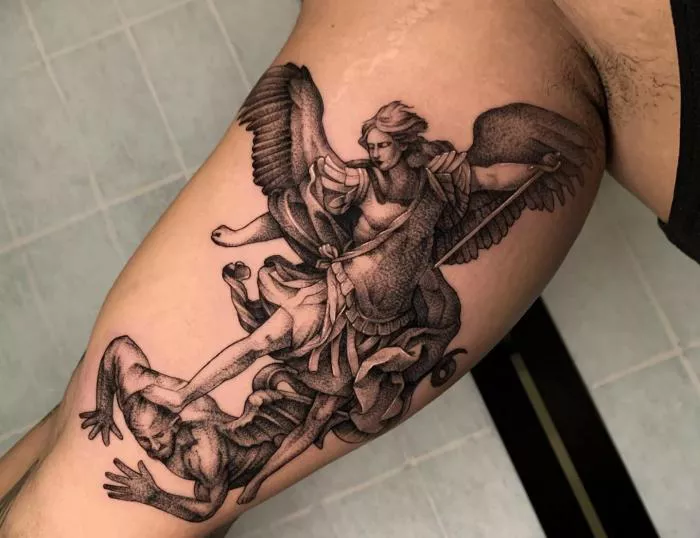Polynesian tattoos are rich in cultural significance, deeply rooted in the traditions of the Pacific Islands. They tell stories of ancestry, achievements, and identity through intricate patterns and symbols. This guide provides an in-depth look at how to design a Polynesian tattoo, emphasizing cultural respect, meaning, and artistic expression.
Understanding Polynesian Tattoos
What Are Polynesian Tattoos?
Polynesian tattoos, or “tatau,” are traditional forms of body art that originate from the Polynesian islands, including Samoa, Hawaii, and Fiji. Each design is imbued with personal and cultural meanings, often reflecting the wearer’s family lineage, social status, and life experiences.
Historical Significance
Cultural Identity: Tattoos have historically served as markers of identity and belonging within Polynesian societies.
Rites of Passage: Many tattoos were earned through significant life events, symbolizing transitions and achievements.
Key Elements of Polynesian Tattoo Design
Patterns and Symbols
Geometric Shapes: Lines, triangles, and spirals are common, creating intricate patterns that often represent natural elements.
Animal Motifs: Animals such as turtles, sharks, and lizards symbolize various traits, like strength and wisdom.
Floral Designs: Flowers and plant motifs often represent beauty, life, and connection to nature.
Cultural Context
Family Heritage: Many designs include symbols that denote family lineage and heritage.
Spiritual Beliefs: Tattoos often convey spiritual significance, connecting the wearer to their ancestors and cultural beliefs.
Planning Your Polynesian Tattoo
Research and Inspiration
Cultural Study: Before designing a Polynesian tattoo, immerse yourself in the culture. Understand the meanings behind symbols and patterns.
Visual Inspiration: Gather images of traditional Polynesian tattoos to inspire your design. Look for patterns, layouts, and elements that resonate with you.
Consulting with Experts
Tattoo Artists: Seek artists who specialize in Polynesian tattoos. Their expertise will ensure that your design is authentic and culturally respectful.
Cultural Practitioners: If possible, consult with cultural practitioners who can provide insights into the meanings and traditions of the designs.
Designing Your Polynesian Tattoo
Choosing a Theme
Personal Significance: Reflect on what aspects of your life or identity you wish to represent. Consider themes like family, strength, or nature.
Cultural Symbols: Choose symbols that align with your theme while respecting their traditional meanings.
Composition and Layout
Flow and Movement: Ensure that the design flows naturally along the body. Polynesian tattoos often wrap around limbs, following the natural contours of the muscles.
Balance and Symmetry: Strive for a balanced composition, where elements are harmoniously distributed throughout the design.
Color Considerations
Traditional Black Ink: Most Polynesian tattoos are done in black ink, emphasizing the patterns and designs.
Color Variations: While traditional styles use black, modern interpretations may incorporate color for additional vibrancy. Discuss these options with your artist.
See also: Designing the Perfect Full Sleeve Tattoo: A Full Guide
Placement Considerations
Common Locations for Polynesian Tattoos
Arms: Full sleeves or specific motifs can beautifully accentuate the arm’s natural shape.
Legs: Thighs and calves are popular areas for larger designs, allowing for intricate detailing.
Back: A full back piece can tell an elaborate story, showcasing a range of symbols and patterns.
Size and Scale
Design Complexity: Larger designs allow for more intricate details, while smaller tattoos may focus on specific symbols.
Personal Preference: Consider your comfort with visibility and how the tattoo will fit into your overall body art.
Working with Your Tattoo Artist
Initial Consultation
Discuss Ideas: Share your inspirations, themes, and any symbols you wish to include with your artist.
Review Portfolios: Look through the artist’s previous work to ensure their style aligns with your vision.
Sketch and Design Approval
Collaborative Process: Work together with your artist to refine the design. Be open to their suggestions, as they may offer valuable insights.
Final Sketch Approval: Before the tattooing begins, review and approve the final sketch to ensure it meets your expectations.
The Tattooing Process
Preparing for Your Tattoo
Health Considerations: Ensure you are in good health before your session. Avoid alcohol and stay hydrated.
Clothing: Wear comfortable clothing that allows easy access to the area being tattooed.
During the Session
Pain Management: Be prepared for some discomfort. Discuss pain management options with your artist if needed.
Take Breaks: If needed, don’t hesitate to take breaks during longer sessions.
Aftercare for Polynesian Tattoos
Immediate Care
Cleaning: Gently clean the tattoo with mild soap and water, avoiding scrubbing.
Moisturizing: Apply a recommended ointment or moisturizer to keep the tattoo hydrated and promote healing.
Long-Term Care
Sun Protection: Protect your tattoo from sun exposure, as UV rays can cause fading. Use sunscreen when outdoors.
Regular Moisturizing: Continue to moisturize the tattooed area to maintain the ink’s vibrancy and the skin’s health.
Common Challenges and Solutions
Cultural Misinterpretation
Respect and Understanding: Ensure you fully understand the meanings behind the symbols and patterns you choose to avoid cultural appropriation.
Consult Experts: Seek guidance from cultural experts if you’re unsure about any aspect of the design.
Design Complexity
Simplicity vs. Intricacy: Striking a balance between detailed designs and simplicity can be challenging. Discuss options with your artist to find the right fit for you.
Adaptation: Be flexible in adapting your design based on the tattoo artist’s recommendations for the best outcome.
Success Stories and Inspirations
Real-Life Examples
Share stories from individuals who have designed meaningful Polynesian tattoos, showcasing their journeys, inspirations, and the significance of their tattoos.
Conclusion
Designing a Polynesian tattoo is an enriching journey that allows for personal expression while honoring cultural traditions. By understanding the significance of symbols, collaborating with skilled artists, and respecting the cultural roots of tattooing, you can create a beautiful piece that resonates with your identity and experiences. Embrace this opportunity to tell your story through art, celebrating the rich heritage of Polynesian tattooing.
This guide provides a comprehensive overview of the process of designing a Polynesian tattoo, ensuring that your artwork is both meaningful and culturally respectful.
You Might Be Interested In
Crafting the Perfect Name Tattoo: A Full Guide Introduction
Mastering the Art of Cover-Up Tattoos: A Comprehensive Guide

